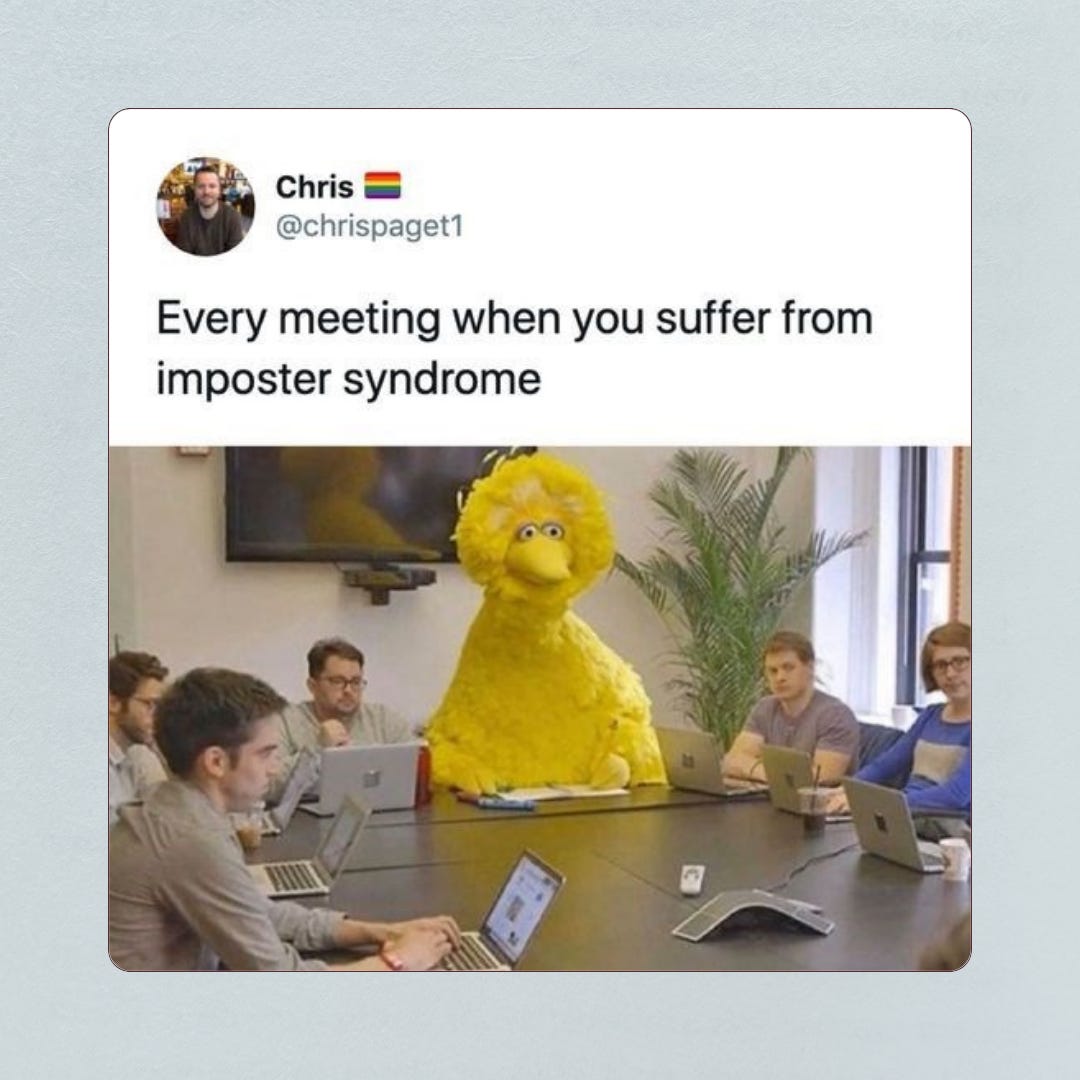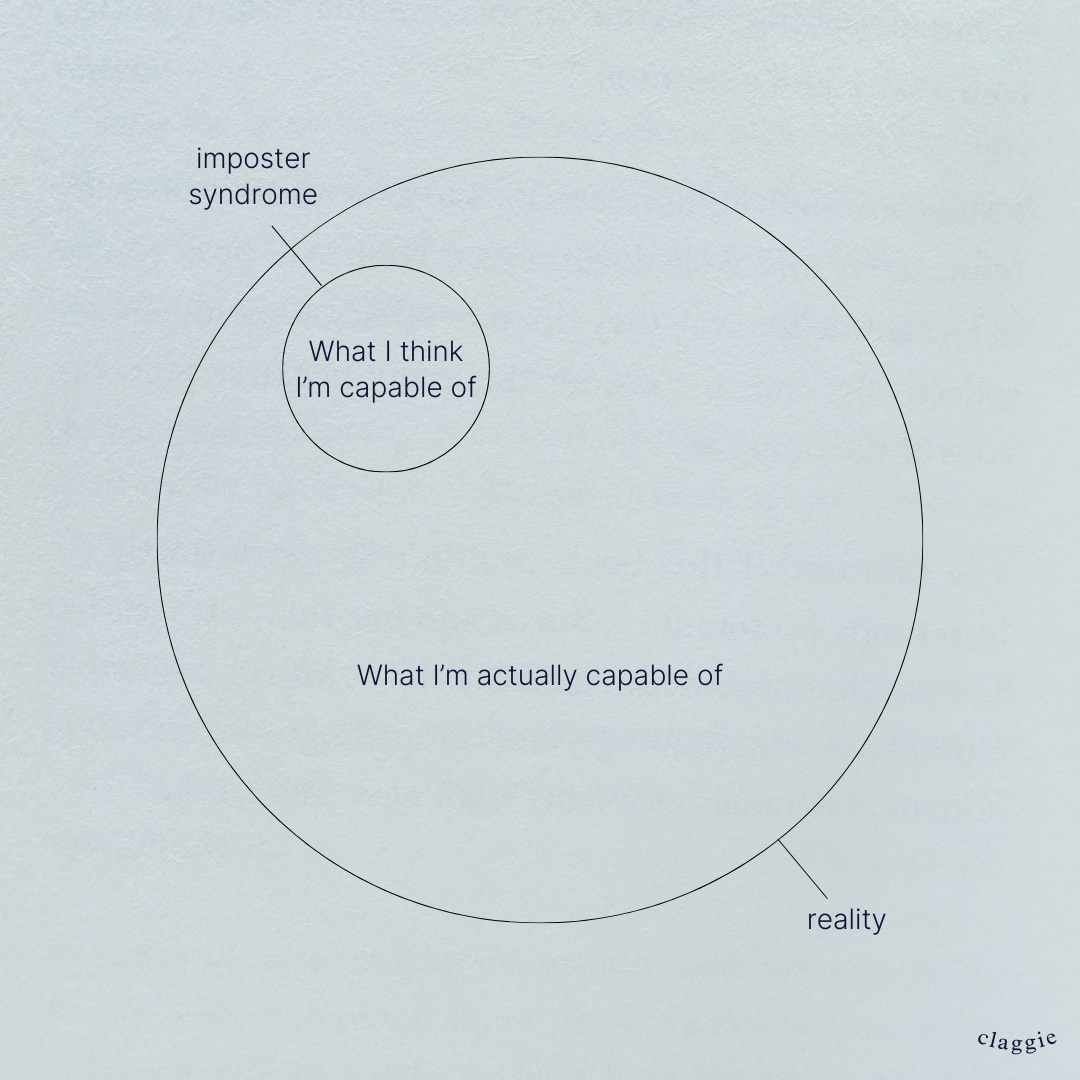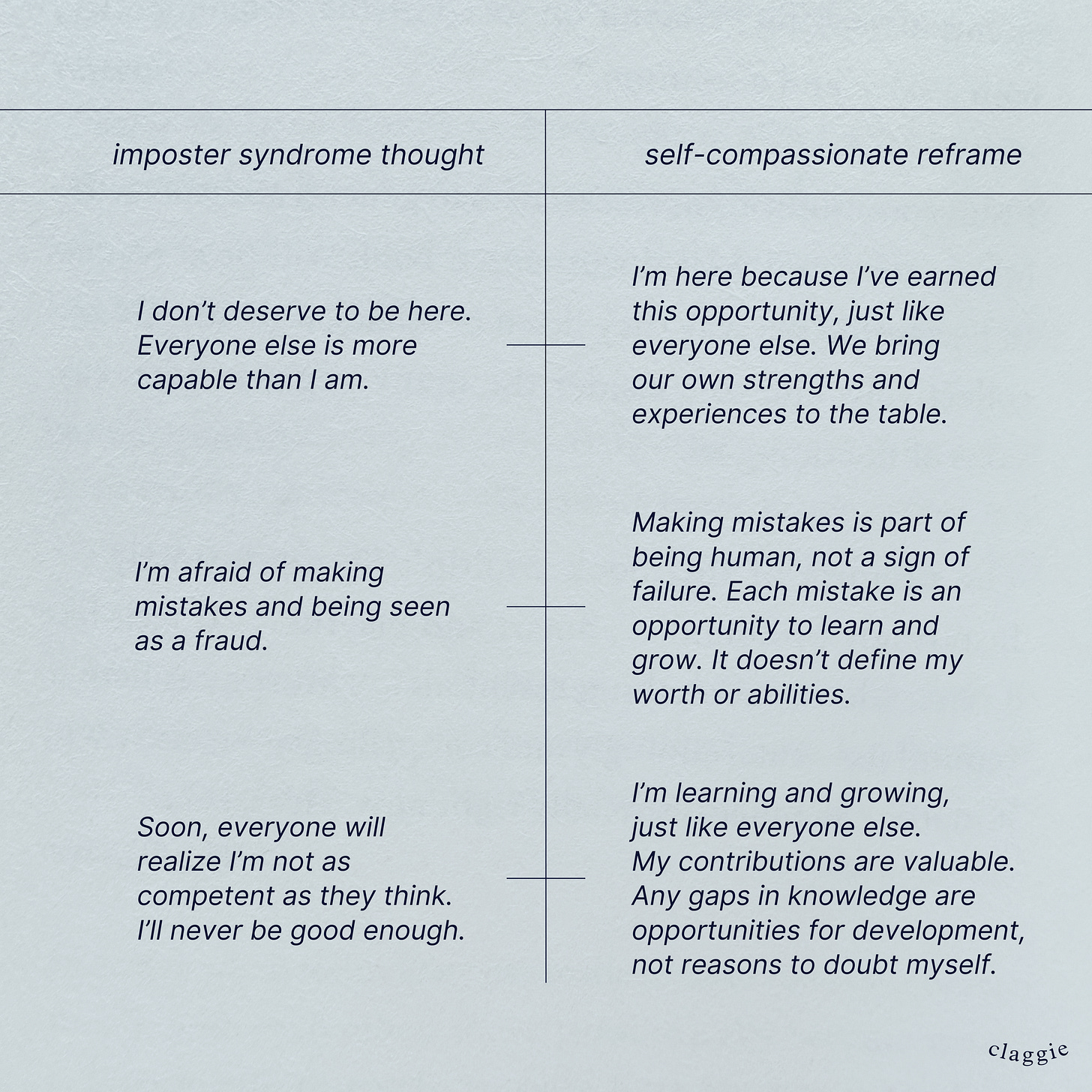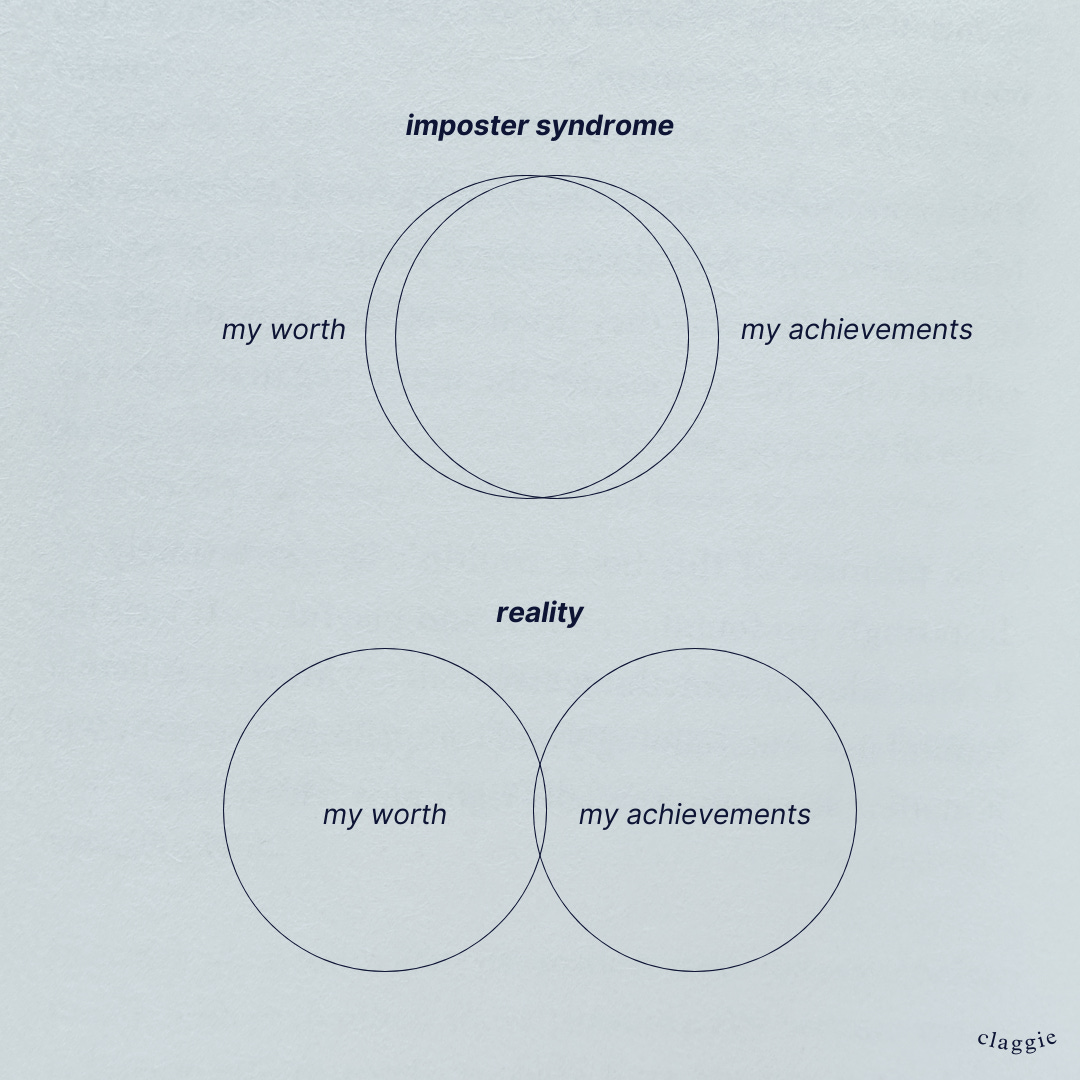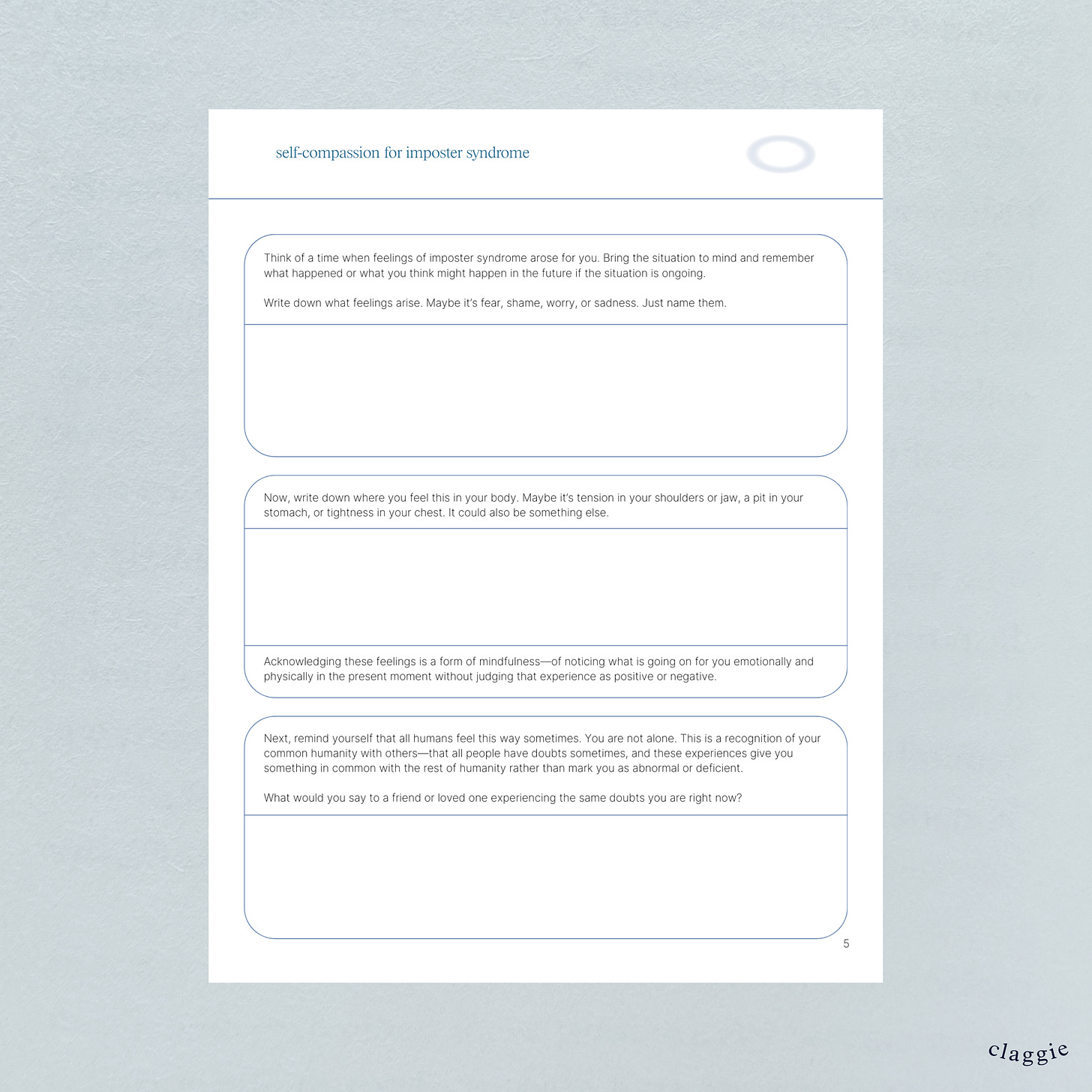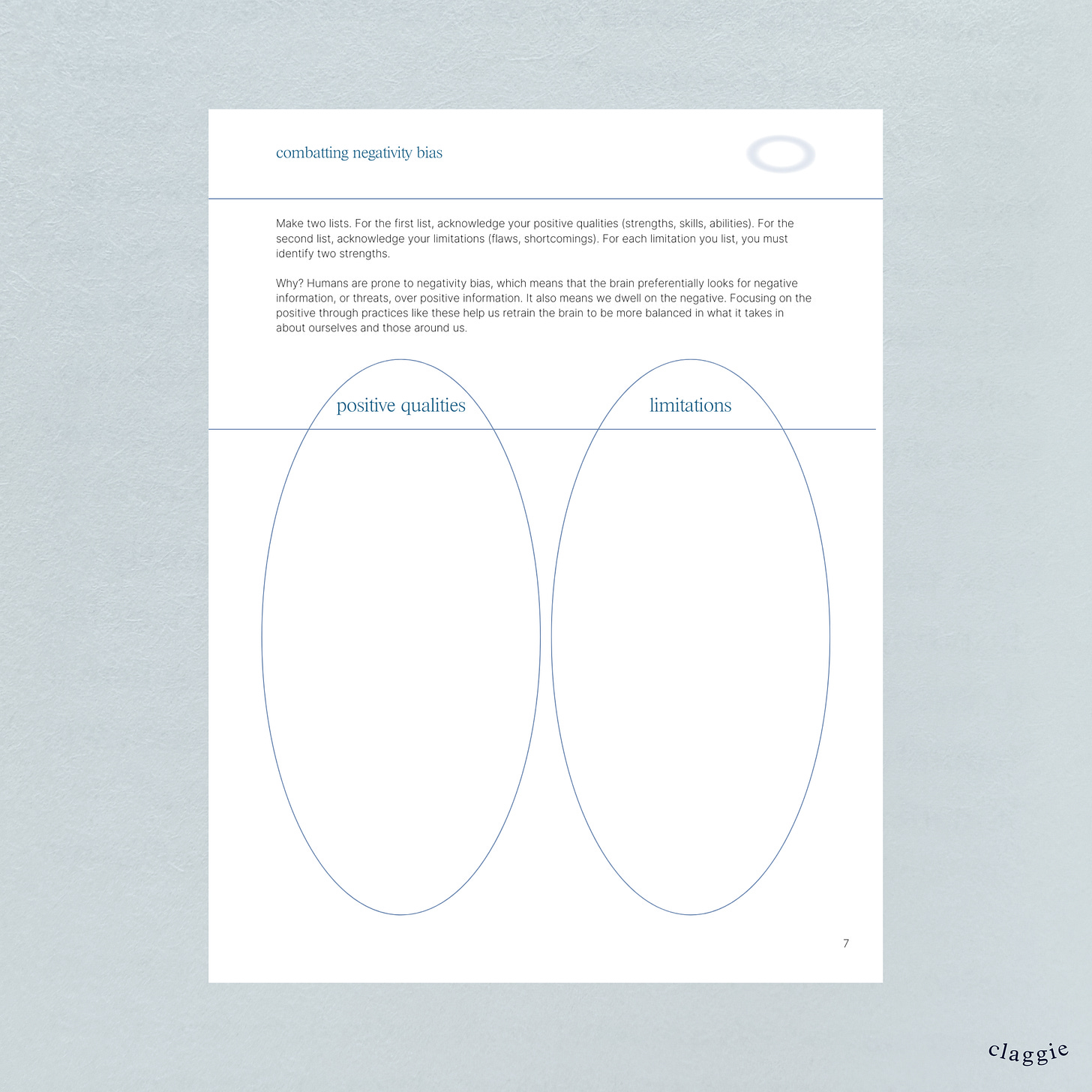There's nothing wrong with you
why imposter syndrome isn't a sign that you're broken
Confession: Whenever I sit down to get started on a new substack article, I’m flooded with thoughts like, “Who am I to help people when I don’t have it all figured out myself?” “Why would anyone listen to me when others are so much better at this?” Because of my experience, I’m able to identify it immediately as imposter syndrome, but it doesn’t stop me from spiraling to my go-to extreme: “Maybe I should just go back to school to get an advanced degree in neuroscience. Then I’ll finally be qualified.” 😂
In other words, I often feel like this:
Luckily, I know I’m not alone. According to the American Psychological Association, research suggests that 70% or more of people experience imposter feelings at some point in their lives. I also asked my followers on Instagram if they have ever experienced feelings of imposter syndrome, and 92% answered yes.
This can feel incredibly isolating when in reality, feelings of self-doubt and imposter syndrome are part of being human. There is nothing wrong with you. More humans experience it than not, so remember that if you’re ever feeling alone. What helps me is reminding myself that imposter syndrome often shows up the strongest when we’re stepping into something we care deeply about. All positive change requires a degree of discomfort.
What is imposter syndrome?
Imposter Syndrome is the internal experience of believing you are not as competent as others believe you to be and that you'll be found out as a fraud. It's a feeling of inadequacy and worthlessness regardless of ability and accomplishments. It is often linked to perfectionism, never feeling "good enough," and comparing yourself to other's achievements.
It can present as chronic self-doubt, fear of being exposed as a fraud, and the inability to internalize success. So, why does it exist?
If we think about it from an evolutionary perspective, it makes sense that so many of us are prone to experience it. Early humans depended heavily on group belonging for survival. Being ostracized could mean a loss of safety and resources. Being attuned to our shortcomings helped us assess risks and avoid situations where we might fail or become vulnerable.
If you experience imposter syndrome, it might show up in these ways:
Feeling like you can’t make a mistake for fear of what other people might think (and when you do make a mistake, agonizing over it).
An inability to accept success or achievement, attributing it to luck or external factors.
An underlying fear of being found out as a fraud.
Downplaying your capabilities, even when you are genuinely skilled at what you do.
Associating being “seen” with being judged or perceived the wrong way.
Constantly comparing yourself to others.
Procrastinating out of fear of failure.
Overpreparing to compensate for a perceived lack of skill.
According to a survey on Instagram, 89% of participants feel like they’re faking it at times, and 89% share that they stop themselves from going after something they want because they don’t feel like they’re good enough.
Imposter syndrome is not just a you issue—it’s systemic. Imposter syndrome disproportionately affects underrepresented groups, particularly women and people of color, due to systemic issues like lack of role models in leadership positions that look like them, microaggressions and feeling like they don’t belong in certain spaces, and biases that make success feel harder to internalize (Mullangi & Jagsi, 2019). The way imposter syndrome manifests can vary widely across different groups. For example, a woman in a male-dominated industry may feel like an outsider, leading to heightened feelings of imposter syndrome.
On the other hand, early research on imposter syndrome focused exclusively on high-achieving women, but modern studies show that men experience it just as often. The idea that imposter syndrome is tied to gender might overlook how widespread it really is (Prata & Gietzen, 2007).
Both can be true: imposter syndrome affects people of all genders and backgrounds, but its impact is often shaped by things like bias and societal pressures. That’s why men can experience it just as often, but underrepresented groups may feel its effects more deeply. POC and women are told by society that we need to fit neatly inside the box they provide, not taking up an extra inch of space. How could we not feel its effects more deeply?
In the popular Harvard Business Review article, Stop Telling Women They Have Imposter Syndrome, the authors, Ruchika Tulshyan and Jodi-Ann Burey, share:
"Imposter syndrome puts the blame on individuals, without accounting for the historical and cultural contexts that are foundational to how it manifests in both women of color and white women. Imposter syndrome directs our view toward fixing women at work instead of fixing the places where women work.”
I highly recommend reading the article, which talks about this subject in depth. Telling women and people of color to read more self-help books and attend conferences as a solution to fix their feelings of imposter syndrome is like telling individuals to recycle to solve our problem with plastics instead of addressing the companies that produce them. Although I’m going to be talking more about individual action moving forward, I want to remind you that these ideas are not meant to “fix” you. Nothing is wrong with you. Imposter syndrome isn’t a problem to solve; it’s proof that you care. We can both acknowledge that the systems we operate under require massive change while also figuring out ways to give ourselves permission to take up space in the world.
These are some of the ways people told me imposter syndrome shows up for them:
At work
In leadership or authority positions
In my cultural identity
Making financial decisions
When pursuing professional opportunities (even when I get an offer)
Parenting a young child
Being a “real adult” at work and in my relationships
As a new therapist in sessions with clients
When I have an idea or solution that I’m about to share with others
When talking to friends
Pricing freelance clients
When trying to make new friends
At school
It’s worse when I’m experiencing burnout/fatigue
When I’m creating content
Playing music
Starting my own business
I also asked participants how imposter syndrome affects them, and here’s what was shared: experiencing increased anxiety, regretting not taking chances, avoiding situations where I’m in the spotlight, deflecting inquiries about my opinion/input, quitting a job because I don’t feel good enough, holding myself back from pursuing new opportunities that might be a great fit for me, not expressing my genuine thoughts & letting myself shine, procrastinating, overthinking, getting scared to try new things because I think “I couldn’t possibly do that,” fear of failure, overanalyzing how things could go wrong, withdrawal and avoiding asking for help/support out of shame. Can you relate to any of these?
While imposter syndrome is common, it doesn’t have to define us. There are ways to break the cycle (or at least start to notice when it shows up). I will explore some of these ideas below, but I also wanted to share that I created a 50+ page guided journal to help move through imposter syndrome and self-doubt if you’d like a more involved practice. It was personally helpful for me to work through it on my own, and I share a lot of tools I use with my coaching clients.
How to move through imposter syndrome:
Practice reframing your thoughts.
This involves intentionally shifting your perspective on a thought, situation, or belief to see it in a more constructive or balanced light. Reframing is particularly helpful for moving through imposter syndrome because it allows us to challenge the limiting beliefs that fuel self-doubt and replace them with thoughts that promote self-compassion and positive growth.
It challenges all-or-nothing thinking, overthinking, and catastrophizing by bringing our thoughts back to reality—to a more logical and supportive place. The brain's ability to reorganize and form new neural connections (neuroplasticity) plays a key role in reframing. By practicing new ways of thinking, we can weaken old, unhelpful thought patterns and strengthen new, positive ones. Consistently reframing self-doubt trains the brain to default to more constructive perspectives over time.
Here are some common thoughts tied to imposter syndrome and examples of how to reframe them:
Remember that your self-worth isn’t earned.
Your self-worth isn’t something you earn—it’s something you already have. Imposter syndrome thrives when we tie our value to achievements, external validation, or what others think of us. But the truth is, no success or failure changes your inherent worth as a person. Disconnecting your self-worth from external factors starts with recognizing that you are valuable simply because you exist. When you allow yourself to separate who you are from what you do, you create space for self-compassion, growth, and authenticity, free from the constant need to prove yourself.
If you have a solid foundation of self-worth to stand on, you’re able to see feelings of failure, making mistakes, and comparison to others as part of the collective human experience. That person you’re comparing yourself to? They’ve also made mistakes, failed, and compared themselves to others. You’re not alone in these feelings.
When you notice thoughts and feelings of imposter syndrome creeping in, try to focus on being curious about what you need instead of letting these thoughts define who you are. Your thoughts are just that: thoughts.
Shift from extrinsic to intrinsic motivation.
Extrinsic motivation is fueled by seeking external approval and rewards. According to Stephanie Harrison, author of New Happy, extrinsic goals include things like:
Popularity: to be admired by many people
Conformity: to please others
Image: to be beautiful
Financial Success: to be rich
Extrinsic goals do not provide fulfillment or joy by themselves alone. You tie your worth to the external validation and reward that comes with achieving the goal.
Intrinsic motivation comes from within. We go after goals because we find them interesting and enjoyable. These goals meet our needs for safety, health, self-acceptance, growth, connection, and community. Intrinsic motivation allows us to find joy in the process itself, not just in achieving the outcome. The reward comes from doing something we love that matters to us and connects us to others.
Next time you are chasing a goal, ask yourself: Am I pursuing this goal because it aligns with my values and brings me personal fulfillment or because I’m seeking external validation or rewards?
Celebrate your wins (big or small)
Letting your wins sink in is essential for building that solid foundation of self-worth and self-trust. When you pause to acknowledge your achievements, you create a positive feedback loop that reinforces your efforts and motivates you to keep going (another example of positive neuroplasticity). It’s recognizing the value of your progress, even in the face of challenges, instead of seeking perfection or external validation. By celebrating your wins, you remind yourself that growth is worth honoring and that every step, no matter how small, contributes to your journey.
Here’s one of my favorite positive neuroplasticity practices for letting the good sink in:
I also love this exercise shared by the NICABM:
Finish the sentence, “I was able to (whatever the successful experience was) because I am (fill in the blank). I am the kind of person who (fill in the blank).
Connect with others.
Connecting with others is one of the most helpful ways to move through self-doubt and imposter syndrome. When you open up about your struggles, you often discover that you’re not alone. Most people, even those you admire, have felt the same way. This sense of shared experience, known as common humanity, reminds us that struggle is a natural part of being human. Fostering social connections through sharing with friends, working with a mentor, or being connected to a bigger form of community in some way challenges the narrative of isolation that often accompanies imposter syndrome. How does knowing that others face self-doubt (even highly successful people) change how you view your own feelings?
The idea that we have to figure everything out on our own isn’t actually helping us grow. Growth requires asking for help and supporting others along the way.
Imposter syndrome is part of being human—especially for those who care deeply about their work and growth. Self-doubt isn’t proof of inadequacy; it’s often a sign of growth and stretching into new challenges. When we step outside of our comfort zone to grow and learn, it’s normal to experience these feelings. See it as something you can work through, as a sign you’re on the right path, instead of a sign that you’re not good enough. You are enough, and I, for one, am excited to see what you put out into the world.
I’ll leave you with one final question: What dreams would you allow yourself to go after if you didn’t let self-doubt get in the way?
And if you’re interested in my guided journal, here’s a teaser of what you’ll find inside:
You can purchase the entire journal here. You can also learn more about my work through my website or Instagram.
If you have any questions, I’d love to hear them! You can comment here or write me an email at kristine@claggie.com.



